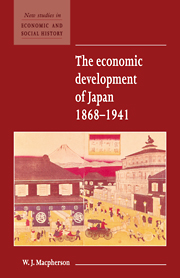Book contents
- Frontmatter
- Contents
- List of tables
- Notes on references
- Preface
- 1 Introduction
- 2 Growth and structural change
- 3 The Tokugawa background (c. 1600–1860)
- 4 The role of the state
- 5 Factors in demand
- 6 Land and agriculture
- 7 Labour supply and the labour market
- 8 Capital, technology and enterprise
- 9 Conclusion
- Bibliography
- Bibliographical update
- Updated bibliography
- Index
- New Studies in Economic and Social History
4 - The role of the state
Published online by Cambridge University Press: 11 January 2010
- Frontmatter
- Contents
- List of tables
- Notes on references
- Preface
- 1 Introduction
- 2 Growth and structural change
- 3 The Tokugawa background (c. 1600–1860)
- 4 The role of the state
- 5 Factors in demand
- 6 Land and agriculture
- 7 Labour supply and the labour market
- 8 Capital, technology and enterprise
- 9 Conclusion
- Bibliography
- Bibliographical update
- Updated bibliography
- Index
- New Studies in Economic and Social History
Summary
From 1868 governments have played a prominent part in Japanese economic development. Since the Second World War the ‘success story’ of ‘Japan Incorporated’ is widely attributed to an optimal growth-oriented mixture of state-planning and private enterprise. For the pre-war period, some place great emphasis on the positive impact of the state and others find that Ashton's ‘spontaneous forces of growth in society that arise from ordinary men and women’ built the modern Japanese economy. Many of the Meiji's nation-building activities were dictated by pragmatism and short-term expediency, to find employment for ex-samurai, to encourage import substitution, to counteract an emergency specie drain, and to build military railways. Fukoku kyohei, inspired by Xenophobic nationalism, dictated rapid industrialisation, with little priority for welfare. Over time the theme increasingly switches to imperialistic expansionism, partly, given the nature of the leaders, an ‘inevitable’ evolution and partly a reaction to specific political and economic events. Just as feudalism's demise was triggered by an external factor, so ‘bourgeoisrepublicanism’ or ‘modern democracy’ was imposed on Japan after the Second World War by foreign occupying powers, with America once again in the van.
The usefulness of state statistics is constrained by the unquantifiable impact of outlays on education, extension services, shipping subsidies and armaments, and by complexities of categorisation. The share of government appears less in constant than in current prices because the prices of goods and services purchased by the state rose relatively to general prices.
- Type
- Chapter
- Information
- The Economic Development of Japan 1868–1941 , pp. 25 - 36Publisher: Cambridge University PressPrint publication year: 1995

